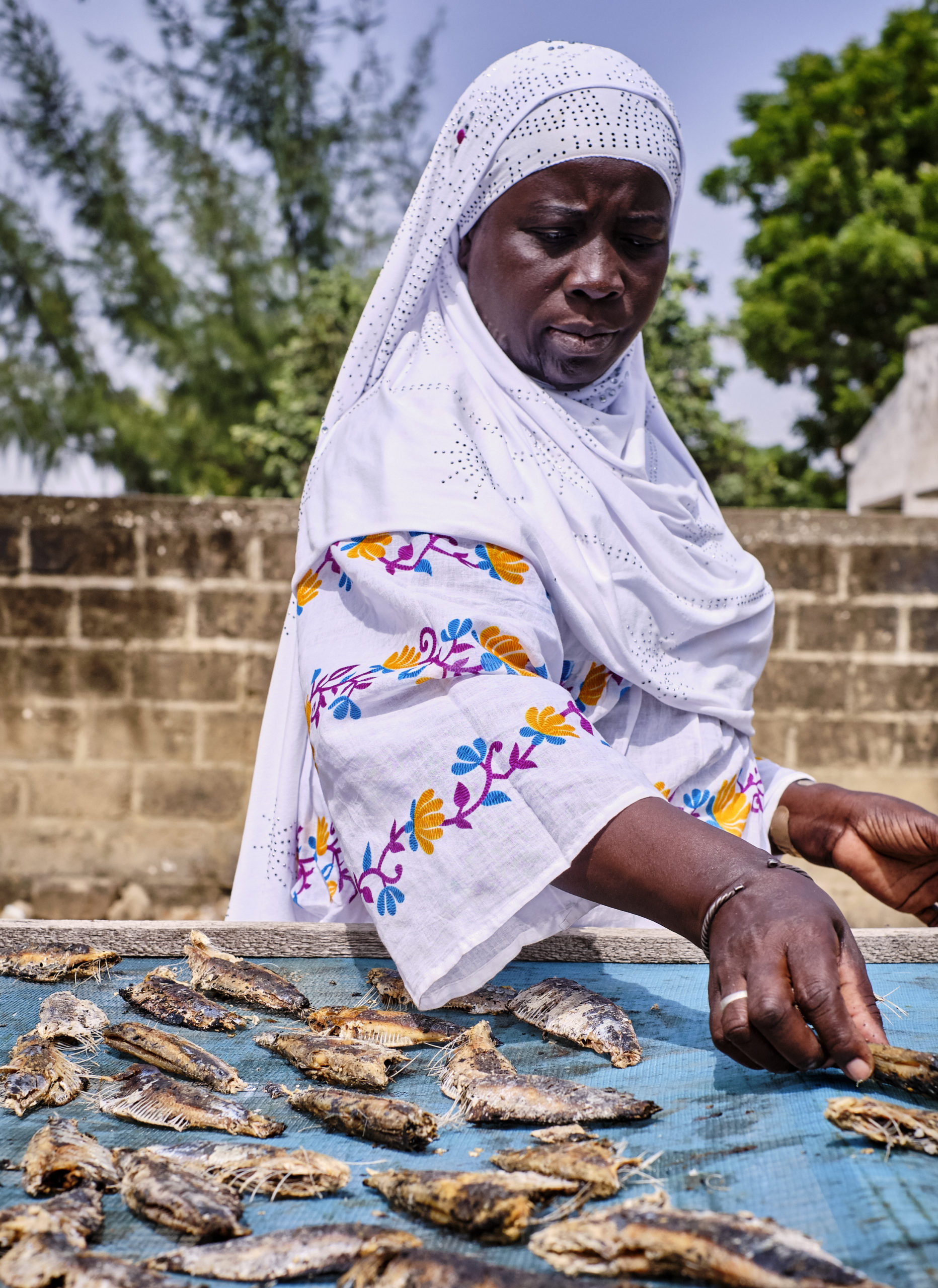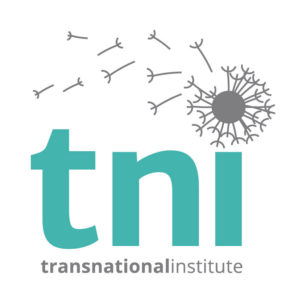Thanks to a training programme to strengthen women’s leadership capacities and management skills, the fisher women now have seats on executive committees and municipal councils. Yet more is needed to make the local and state authorities address their concerns around overfishing and the fishmeal factories. Nevertheless, a cultural shift is under way, as action research by Enda Graf Sahel has made young men especially more aware of women’s heavy burden of work, motivating them to take up some household tasks, such as collecting water, taking children to school and working in vegetable gardens.
The impacts of overfishing in Senegalese coastal zones
As the climate crisis deepens, the ocean is increasingly seen as both the site of some of the most troubling ecological devastation and a realm of opportunities for much-needed climate change adaptation and mitigation strategies. There is perhaps no place where this double-edged sword cuts more sharply than along the coastline and in the river deltas of Senegal. Some 80 per cent of protein consumed in the country comes from fish and the fishing sector provides nearly 700,000 jobs. A culture profoundly shaped and sustained by its relationship with the sea has found itself in the middle of a global rush by big corporations to extract one ocean resource after another.
The world is increasingly looking to fish farming as a “healthy, climate-friendly protein alternative to meat, a way to protect ocean stocks and ‘solve world hunger.’” However, as New Internationalist reveals, “Most consumers are unaware that wild pelagic fish are a key ingredient for carnivorous farmed fish – like sea bass and salmon – and now account for 30 per cent of global catch.”[1] Senegal has become ground zero for this boom in fishmeal factories and the appetite for small fish that comes with it.
Now, the rapid expansion of fishmeal factories and freezing plants for these coastal fish (mainly sardinella) is increasing overfishing and creating competition between traditional fishmongers and women processors over local catches.[2] On top of that, noxious fumes and toxic waste dumping by these factories are exacerbating environmental problems and undermining local tourist economies.[3] Fishing and shellfish resources are also very much affected by the depletion of fish resources due to demand for fishmeal as well as by the effects of climate change, specifically, sea level rise and coastal erosion. These climate impacts have also pushed many men to leave their villages to work in urban areas or to migrate, often illegally, to European countries. This situation reinforces the hardships of women, who find themselves alone facing many difficulties due to the climate and economic crises.
In the face of these troubling developments, the women fishers, shellfish harvesters, fish processors and fishmongers of the Saloum Delta are demonstrating that a different way of reshaping the fisheries sector, via an energy transition, grounded in gender and climate justice, is possible.
Building gender and climate justice
In 1981, the Saloum Delta was classified as a biosphere reserve and in 2011, UNESCO included the area in its World Heritage List due to its exceptional biodiversity and the ancient history of human settlement. The Delta’s mangrove forests and sea life provide jobs, fuel, food and environmental protection to residents of the 5,000 square kilometre delta. Mangroves are essential to protecting against coastal erosion and the shell mounds resulting from traditional shellfish collection and fishing have created a number of islets which help stabilise the delta’s land and channels.[4]
Faced with rising water levels, soil salinisation, industrial overfishing, and the explosive growth of fishmeal factories, women fishers from seven villages of the Saloum Delta are working to restore and develop sustainable fishing and processing practices for mangrove shellfish. In collaboration with the organisation Enda Graf Sahel,[5] some 4,800 women are carrying forward an energy transition in their sector. They mainly gather, smoke and dry oysters, Noah’s Ark shells, clams and other types of shellfish. They supply local and regional markets, guaranteeing access to nutritious food for the most vulnerable populations, especially those living far from coastal areas. However, this processing requires significant energy resources and can contribute to the deforestation of the mangrove forests. This is why combining an energy transition with artisanal fishing is key to climate justice.
In order to reduce the women’s energy needs, Enda Graf Sahel has designed and helped facilitate access to improved ovens for collective use as well as smaller stoves for homes. The new ovens and stoves require less wood fuel and are more ergonomically designed. Thanks to public and private donors, as well as a grant from the Gender and Climate Solutions Awards in 2016, more than 200 improved stoves have been produced by local craftspeople and put to use among the fisherwomen of the Saloum Delta. The new equipment also reduces the drudgery of the women’s work and the incidence of respiratory diseases caused by smoke.
Reducing CO2 emissions and reforesting mangroves
The use of improved ovens reduces the quantity of wood burned by about 75% and therefore decreases CO2emissions. It also improves the quality of the products. Previous processing methods were based on spreading the fish on the ground and braising them with straw or small wood pieces. Now the fish are placed on a grill inside the new concrete ovens. The stoves for individual families are made of metal and are smaller, which are used to cook meals.
Fisher women’s work towards climate justice includes more than just reducing fuel use. The women learn how to reforest the mangrove, to guarantee the reproduction of the species. Shellfish harvesting is always combined with mangrove reforestation activities and the seeding of clams, activities that are culturally carried out annually by women, and are essential for the preservation of the environment.
Women in charge of the local fish economy
As well as reducing CO2emissions, the improved ovens and stoves bring economic benefits, as women need to spend less money on fuel. Although, no study has been carried out to precisely quantify the additional income generated, decreased fuel costs are important as the traditional fishery plays a fundamental role in the food security of the population in general and vulnerable groups in particular. The new technology also makes these jobs more attractive and viable for young people, reducing the incentives for emigration. By being present throughout the entire value chain, from shellfish collection to production and processing, as well as selling, women contribute to maintaining and developing the local economy, creating jobs for a major part of the population.
Action research carried out by Enda Graf Sahel in 2013 with approximately 600 people looked at the role and socio-economic contribution of women in the fishing sector in the four largest fishing areas of Senegal. This study showed that processing fishery products is essential to ensure the country’s food security, the creation of local jobs and the economic survival of many households. It also showed that there is a general trend of women becoming more and more precarious in this industry, as fish stocks are depleted. Women tend to become workers in fishmeal factories and they lose income, as well as economic and political autonomy. The growing influence of fishmeal factories and overfishing suggests that there is a need for deeper socio-political transformation in order to consolidate the impacts of the energy transition taking place in the Saloum Delta fishery.
Women demanding recognition and decision-making power
In the fishing sector, the majority of representative structures are managed by men. Even though women outnumber men in the organisations, they are not represented in decision-making bodies, such as executive committees. For this reason, Enda Graf Sahel initiated a training programme to strengthen women’s leadership capacities (individual as well as collective) and their skills in organisational management. The training was conducted in the presence of men. Women then demanded their place in the executive committees by running for elections; in some cases, quotas were established, which facilitated women’s access to the different decision-making bodies. More and more women are elected to the municipal councils, thanks to the training they have received in leadership, decentralisation policy, gender-sensitive budgeting and other topics. They are now able to bring forward the demands of women fishers and processors. But despite their presence, local authorities are still not taking many of their concerns into account. For example, elected officials continue to grant land to investors to set up fishmeal factories, which require large quantities of fish, depleting the resource and destroying the ecosystem.
To further strengthen the political power of fisher women, Enda Graf Sahel has set up a national network that brings together all the women in the fishing sector. It is now present in seven maritime regions of Senegal. This network is called REFEPAS and mobilises 30,000 members. It calls on political decision-makers to address global problems, such as the negative impact of fishmeal factories and the government granting fishing licences to foreign boats, which causes overfishing. This network also aims to obtain official recognition for shellfish-mongers and fish processors through a professional certification scheme which can only be obtained after participating in technical and sanitary training.
Addressing the gender division of labour
Of course, formalising women’s labour in the fisheries sector only recognises part of the total work they do. To make this visible, Enda Graf helped carry out another action research project to highlight the burden of women’s work in the villages of the Saloum Delta. Women are responsible for economic production and domestic labour in the home and for daily care of the family and the community. In addition to these three roles, they are also expected to take care of the local environment. Sharing the results of this action research has made men – especially young men – more sensitive to women’s heavy burden of work and motivated them to get involved in certain household tasks, such as collecting water, taking children to school, and working in the vegetable gardens. The results have been communicated in films and plays, to raise awareness among the general public. This has led to a reduction in domestic violence as well as a more even distribution of household chores in the households that participated in the workshops.
Conclusions
The modification of ovens and stoves may seem a simple approach to a complex issue. Indeed, Enda Graf Sahel staff and project participants see the improved ovens and stoves as an important yet insufficient step in their energy transition. They hope to move towards fully solar-powered equipment to eliminate the use of wood in fish processing entirely. However, progress is slow since this shift requires a significant investment of funds as well as training for fisherwomen to be able to use the solar technology in their work.
In truth, energy efficient ovens are just one component of a much bigger effort, which has served both to reduce the environmental impact of the fisheries sector in the Saloum River Delta without simply displacing or externalizing the ecological consequences as the shift to large scale aquaculture has done globally; and to strengthen local economies by ensuring job stability and dignity among fisher women.
Unlike fishmeal factories and ongoing overfishing in West African waters, the energy transition and mangrove reforestation initiatives facilitated by Enda Graf Sahel also encourage important socio-political shifts that are key to building gender and climate justice.
Resources
[1] Hazel Healy, ‘The Disappearing Senegalese Sardines’, New Internationalist, Octobre 2021, https://newint.org/immersive/2021/09/20/disappearing-senegalese-sardines-fjf.
[2] Greenpeace, ‘A Waste of Fish. Food Security under Threat from the Fishmeal and Fish Oil Industry in West Africa’ (Greenpeace Africa and Greenpeace International, 2019), 16, https://www.greenpeace.org/static/planet4-international-stateless/2019/06/56fbee4b-a-waste-of-fish-report-en-high-res.pdf.
[3] Mustapha Manneh, Louise Hunt and Jessica Aldred, ‘A Foreign-Owned Fishmeal Factory Causes a Stink in Senegal’, Earth Journalism Network, Novembre 2021, https://earthjournalism.net/stories/a-foreign-owned-fishmeal-factory-causes-a-stink-in-senegal.
[4] Voir: https://whc-unesco-org.eur.idm.oclc.org/en/list/1359/
[5] https://endagrafsahel.org/. Le travail décrit dans cet article est base en grande partie sur une entrevue avec Fatou Ndoye, la coordinatrice du projet chez Enda Graf Sahel.
About the author
Zoe Brent is a researcher with the Agrarian Justice team at TNI, where she works on issues related to food, land and water politics. She holds an MA in International Relations from the Universidad del Salvador in Buenos Aires, Argentina. Currently Brent is pursuing her PhD at the International Institute of Social Studies (ISS) in The Hague where her research focuses on land access, the commons and food sovereignty in the global north.
Fatou Ndoye is sociologist, coordinator of the Food Security Pole of Enda Graf Sahel, and gender, climate and development expert. NDoye has been working since 1997 for Enda Graf Sahel, an NGO dedicated to the social and economic development of disadvantaged populations in Senegal. She supports women’s entrepreneurship and sustainable value chains in agriculture, fishing and small-scale livestock farming.
Coordinator: Lavinia Steinfort
Copy editor: Sarah Finch
Translator: Timothé Feodoroff
This case study is a joint publication by the Transnational Institute (TNI) and Women Engage for a Common Future (WECF).





